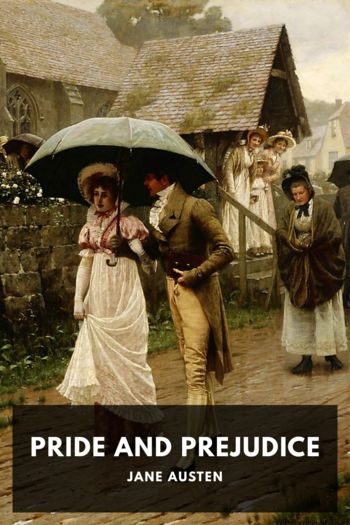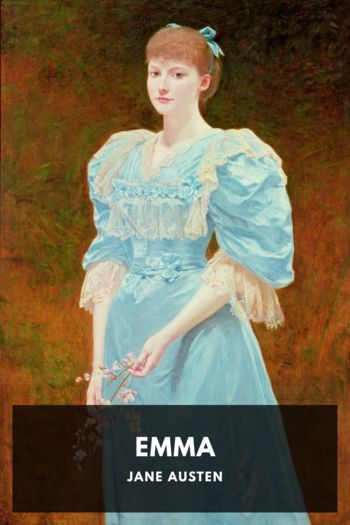Pride and Prejudice by Jane Austen (best ereader for students txt) 📕

- Author: Jane Austen
Book online «Pride and Prejudice by Jane Austen (best ereader for students txt) 📕». Author Jane Austen
In the evening, soon after Mr. Bennet withdrew to the library, she saw Mr. Darcy rise also and follow him, and her agitation on seeing it was extreme. She did not fear her father’s opposition, but he was going to be made unhappy, and that it should be through her means, that she, his favourite child, should be distressing him by her choice, should be filling him with fears and regrets in disposing of her, was a wretched reflection, and she sat in misery till Mr. Darcy appeared again, when, looking at him, she was a little relieved by his smile. In a few minutes he approached the table where she was sitting with Kitty; and, while pretending to admire her work, said in a whisper, “Go to your father, he wants you in the library.” She was gone directly.
Her father was walking about the room, looking grave and anxious. “Lizzy,” said he, “what are you doing? Are you out of your senses, to be accepting this man? Have not you always hated him?”
How earnestly did she then wish that her former opinions had been more reasonable, her expressions more moderate! It would have spared her from explanations and professions which it was exceedingly awkward to give; but they were now necessary, and she assured him with some confusion, of her attachment to Mr. Darcy.
“Or in other words, you are determined to have him. He is rich, to be sure, and you may have more fine clothes and fine carriages than Jane. But will they make you happy?”
“Have you any other objection,” said Elizabeth, “than your belief of my indifference?”
“None at all. We all know him to be a proud, unpleasant sort of man; but this would be nothing if you really liked him.”
“I do, I do like him,” she replied, with tears in her eyes, “I love him. Indeed he has no improper pride. He is perfectly amiable. You do not know what he really is; then pray do not pain me by speaking of him in such terms.”
“Lizzy,” said her father, “I have given him my consent. He is the kind of man, indeed, to whom I should never dare refuse anything, which he condescended to ask. I now give it to you, if you are resolved on having him. But let me advise you to think better of it. I know your disposition, Lizzy. I know that you could be neither happy nor respectable, unless you truly esteemed your husband; unless you looked up to him as a superior. Your lively talents would place you in the greatest danger in an unequal marriage. You could scarcely escape discredit and misery. My child, let me not have the grief of seeing you unable to respect your partner in life. You know not what you are about.”
Elizabeth, still more affected, was earnest and solemn in her reply; and at length, by repeated assurances that Mr. Darcy was really the object of her choice, by explaining the gradual change which her estimation of him had undergone, relating her absolute certainty that his affection was not the work of a day, but had stood the test of many months suspense, and enumerating with energy all his good qualities, she did conquer her father’s incredulity, and reconcile him to the match.
“Well, my dear,” said he, when she ceased speaking, “I have no more to say. If this be the case, he deserves you. I could not have parted with you, my Lizzy, to anyone less worthy.”
To complete the favourable impression, she then told him what Mr. Darcy had voluntarily done for Lydia. He heard her with astonishment.
“This is an evening of wonders, indeed! And so, Darcy did everything; made up the match, gave the money, paid the fellow’s debts, and got him his commission! So much the better. It will save me a world of trouble and economy. Had it been your uncle’s doing, I must and would have paid him; but these violent young lovers carry everything their own way. I shall offer to pay him tomorrow; he will rant and storm about his love for you, and there will be an end of the matter.”
He then recollected her embarrassment a few days before, on his reading Mr. Collins’s letter; and after laughing at her some time, allowed her at last to go—saying, as she quitted the room, “If any young men come for Mary or Kitty, send them in, for I am quite at leisure.”
Elizabeth’s mind was now relieved from a very heavy weight; and, after half an hour’s quiet reflection in her own room, she was able to join the others with tolerable composure. Everything was too recent for gaiety, but the evening passed tranquilly away; there was no longer anything material to be dreaded, and the comfort of ease and familiarity would come in time.
When her mother went up to her dressing-room at night, she followed her, and made the important communication. Its effect was most extraordinary; for on first hearing it, Mrs. Bennet sat quite still, and unable to utter a syllable. Nor was it under many, many minutes, that she could comprehend what she heard; though not in general backward to credit what was for the advantage of her family, or that came in the shape of a lover to any of them. She began at length to recover, to fidget about in her chair, get up, sit down again, wonder, and bless herself.
“Good gracious! Lord bless me! only think! dear me! Mr. Darcy! Who would have thought it! And is it really true? Oh! my sweetest Lizzy! how rich and how great you will be! What pin-money, what jewels, what carriages you will have! Jane’s is nothing to it—nothing at all. I am so pleased—so happy. Such a charming man!—so handsome! so tall!—Oh, my dear Lizzy! pray apologise for my having disliked





Comments (0)